人教版(2019)必修 第三册Unit 1 Festivals and Celebrations课外拓展中华传统节日中元节课件(共22张PPT)
文档属性
| 名称 | 人教版(2019)必修 第三册Unit 1 Festivals and Celebrations课外拓展中华传统节日中元节课件(共22张PPT) | 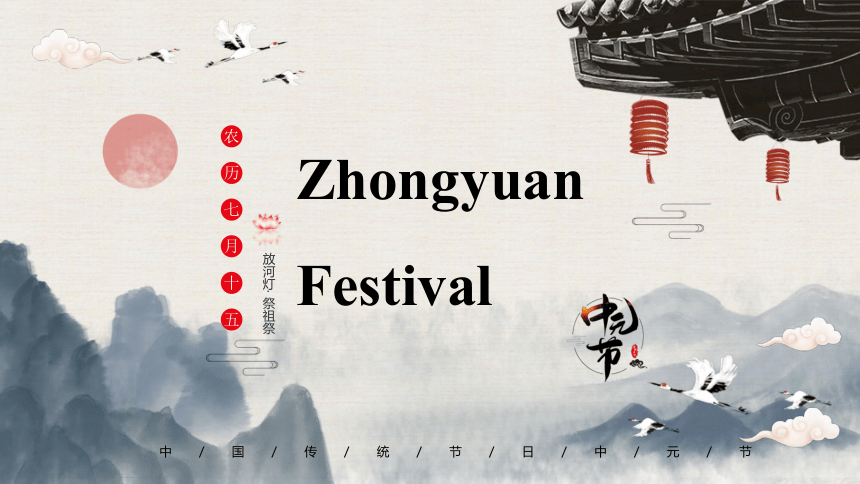 | |
| 格式 | zip | ||
| 文件大小 | 11.4MB | ||
| 资源类型 | 教案 | ||
| 版本资源 | 人教版(2019) | ||
| 科目 | 英语 | ||
| 更新时间 | 2023-01-16 14:29:43 | ||
图片预览

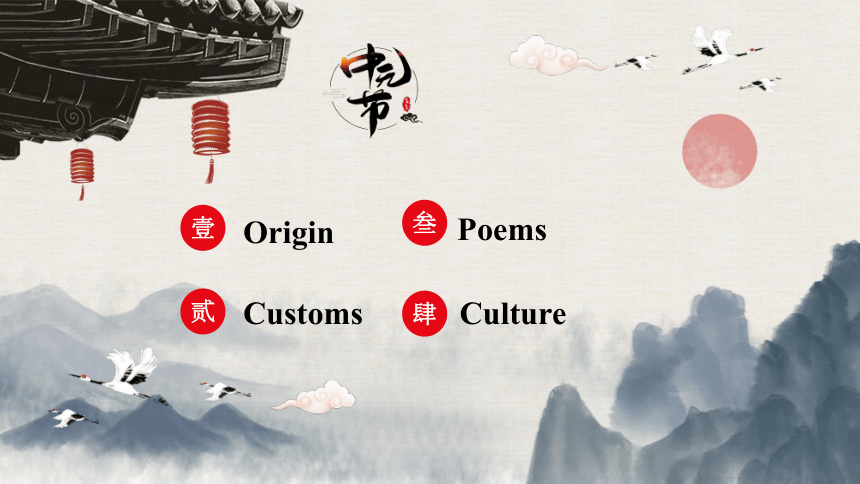
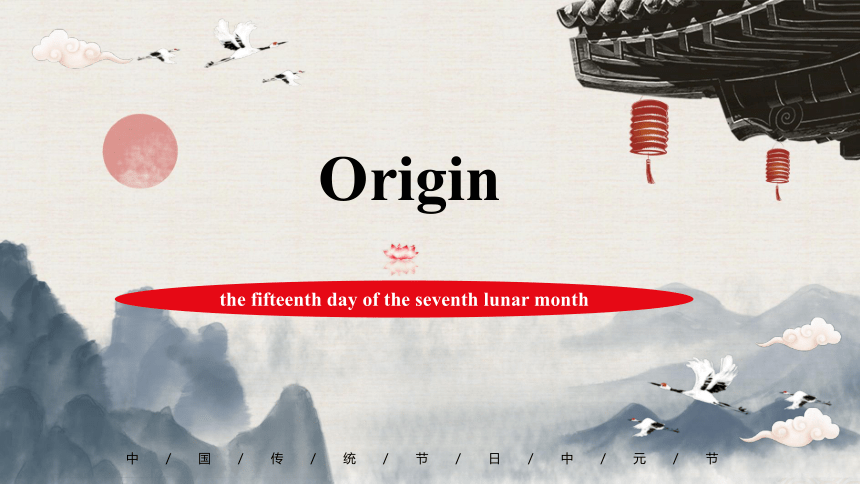
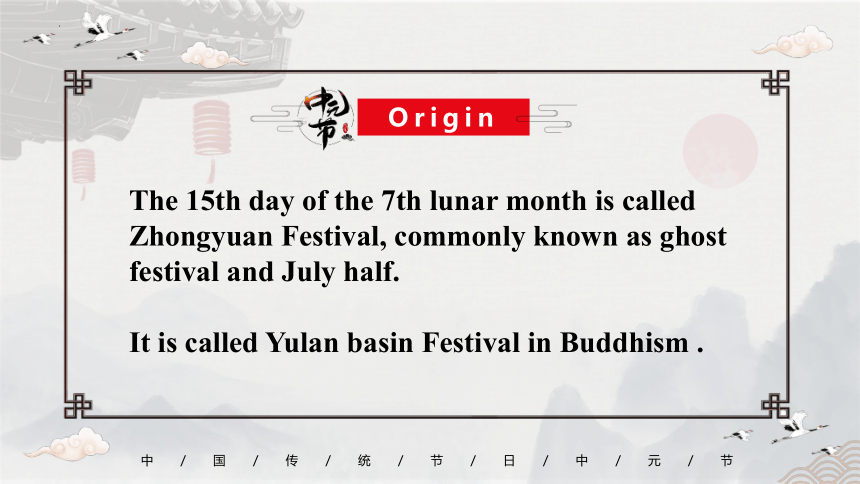
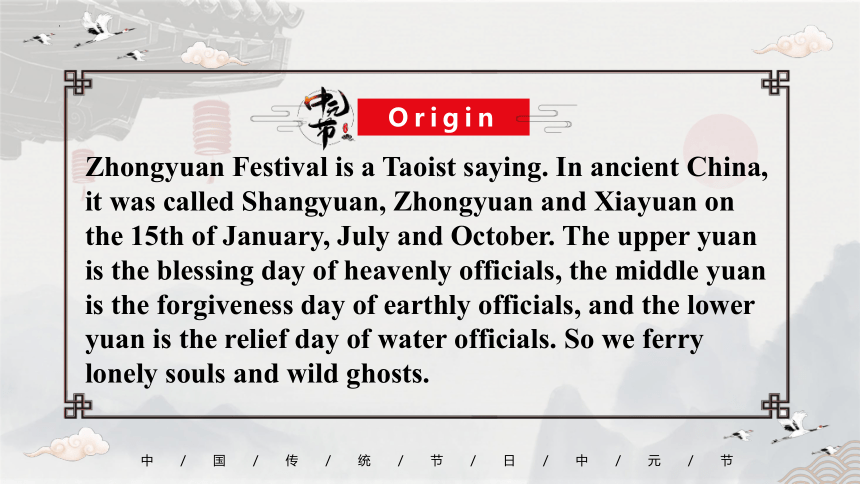
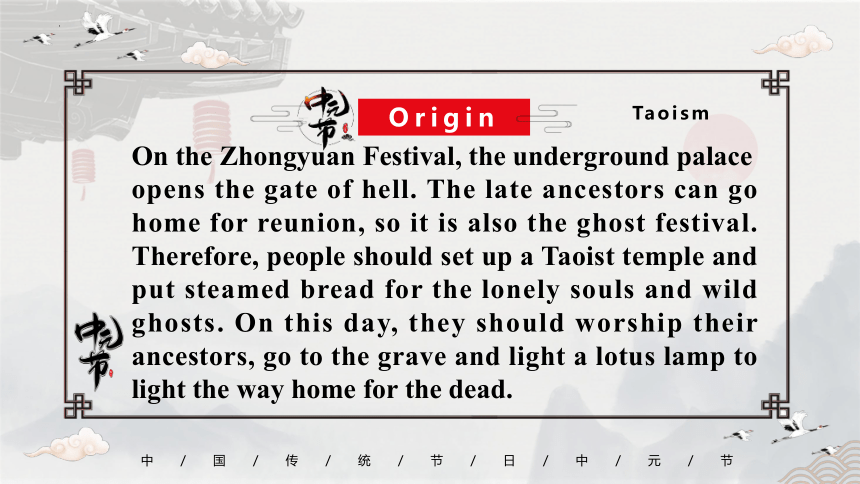
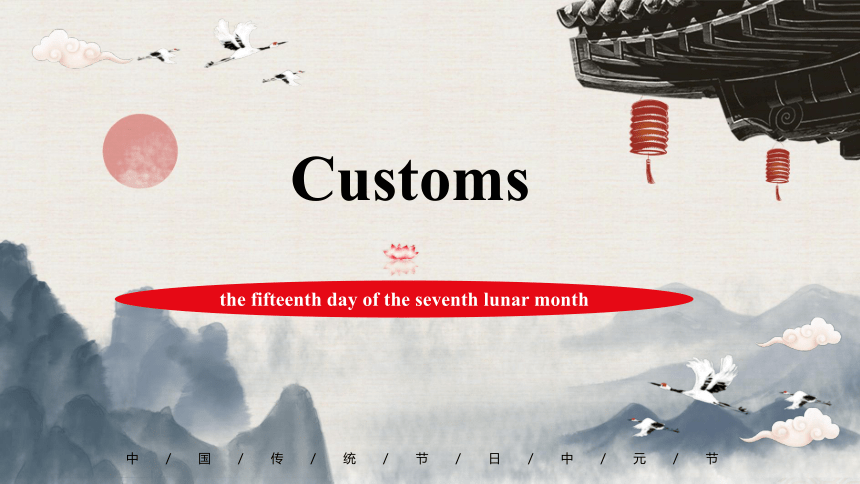
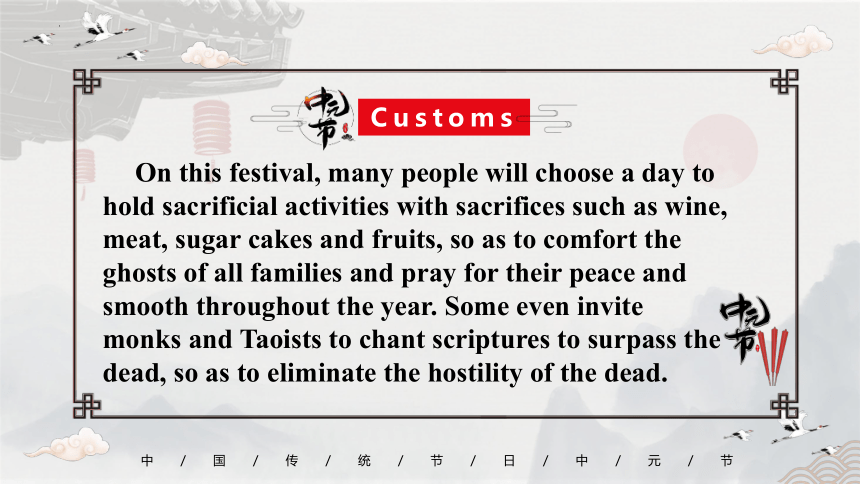
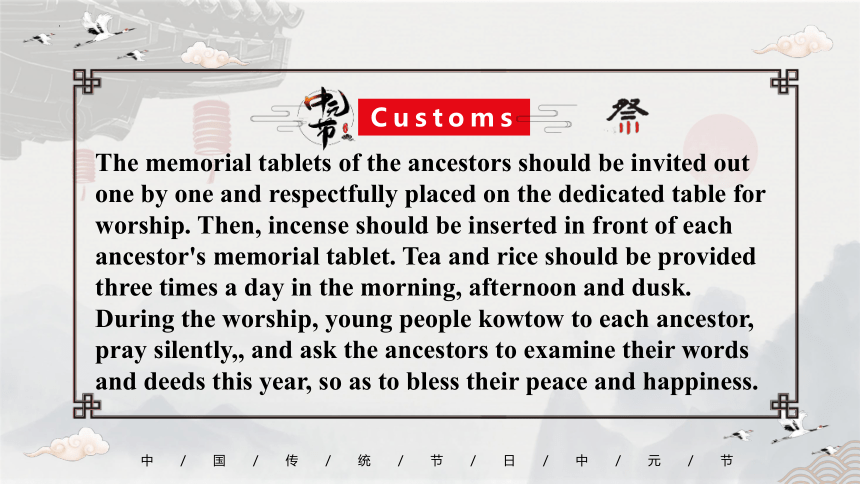
文档简介
(共22张PPT)
农
历
七
月
五
十
放河灯· 祭祖祭
中/国/传/统/节/日/中/元/节
Zhongyuan Festival
壹
贰
叁
肆
Origin
Customs
Poems
Culture
Origin
中/国/传/统/节/日/中/元/节
the fifteenth day of the seventh lunar month
The 15th day of the 7th lunar month is called Zhongyuan Festival, commonly known as ghost festival and July half.
It is called Yulan basin Festival in Buddhism .
Origin
Zhongyuan Festival is a Taoist saying. In ancient China, it was called Shangyuan, Zhongyuan and Xiayuan on the 15th of January, July and October. The upper yuan is the blessing day of heavenly officials, the middle yuan is the forgiveness day of earthly officials, and the lower yuan is the relief day of water officials. So we ferry lonely souls and wild ghosts.
Origin
Origin
Taoism
On the Zhongyuan Festival, the underground palace opens the gate of hell. The late ancestors can go home for reunion, so it is also the ghost festival. Therefore, people should set up a Taoist temple and put steamed bread for the lonely souls and wild ghosts. On this day, they should worship their ancestors, go to the grave and light a lotus lamp to light the way home for the dead.
中/国/传/统/节/日/中/元/节
Customs
the fifteenth day of the seventh lunar month
On this festival, many people will choose a day to hold sacrificial activities with sacrifices such as wine, meat, sugar cakes and fruits, so as to comfort the ghosts of all families and pray for their peace and smooth throughout the year. Some even invite monks and Taoists to chant scriptures to surpass the dead, so as to eliminate the hostility of the dead.
Customs
The memorial tablets of the ancestors should be invited out one by one and respectfully placed on the dedicated table for worship. Then, incense should be inserted in front of each ancestor's memorial tablet. Tea and rice should be provided three times a day in the morning, afternoon and dusk. During the worship, young people kowtow to each ancestor, pray silently,, and ask the ancestors to examine their words and deeds this year, so as to bless their peace and happiness.
Customs
Putting the river lantern is a happy activity nowadays.
River lanterns are also called "Lotus lanterns". They are usually placed on the base with candles and placed in rivers, lakes and seas on Zhongyuan night. The purpose of putting river lanterns is to ferry drowning ghosts and other lonely ghosts in the water, which shows that the living gentlemen have not forgotten the dead ghost.
Customs
Dough sculpture activities are popular among folk women. The steamed buns given to the younger generation should be made into a flat shape, which is called the mian’yang. Take the meaning of the lamb to drink milk and kneel on both knees, hoping the younger generation will not forget the kindness of their parents' upbringing.
Customs
The steamed buns given to the elders should be kneaded into an adult shape, which is called mian’ren, which means that the hall is full of children and grandchildren, and both happiness and longevity. The steamed buns given to the people of the same generation should be kneaded into a fish shape, which is called mian’yu, which means getting more every year.
Customs
On the fifteenth day of the seventh lunar month, many parts of the country choose to eat ducks. Why It turns out that "duck" has the same sound as "pressure" in Chinese, which is homonymous. Eating duck is to suppress the evil "soul".
Customs
中/国/传/统/节/日/中/元/节
Poems
the fifteenth day of the seventh lunar month
中元夜看月
唐丨罗隐
朦胧南溟月,汹涌出云涛。
下射长鲸眼,遥分玉兔毫。
势来牛斗动,路越宵冥高。
竟夕瞻光影,昂头把白醪。
Poems
中元夜
唐丨李郢
江南水寺中元夜,
金粟栏边见月娥。
红烛影回仙态近,
翠环光动见人多。
香飘彩殿凝兰麝,
露绕青衣杂绮罗。
湘水夜空巫峡远,
不知归路欲如何。
Poems
中元作
唐丨李商隐
绛节飘飖宫国来,
中元朝拜上清回。
羊权须得金条脱,
温峤终虚玉镜台。
曾省惊眠闻雨过,
不知迷路为花开。
有娀未抵瀛洲远,
青雀如何鸩鸟媒。
Poems
中元夜百花洲作
宋丨范仲淹
南阳太守清狂发,
未到中秋先赏月。
百花洲里夜忘归,
绿梧无声露光滑。
天学碧海吐明珠,
寒辉射宝星斗疏。
西楼下看人间世,
莹然都在清玉壶。
从来酷暑不可避,
今夕凉生岂天意。
一笛吹销万里云,
主人高歌客大醉。
客醉起舞逐我歌,
弗歌弗舞如老何。
Poems
中/国/传/统/节/日/中/元/节
Culture
the fifteenth day of the seventh lunar month
The most important cultural core of Zhongyuan Festival is ancestor worship. The essence is the inheritance of "filial piety and customs".
China formed the concept of ancestor worship as early as the pre Qin Dynasty. Later, Confucianism refined the consciousness of filial piety and kinship, and developed clan organization and social structure. The Chinese people have a strong ancestral concept.
Culture
Culture
Concept of ghosts and gods.
Chinese people believe that when people die and go to the underworld, their daily life is no different from that of living people, and they also need to communicate with us regularly. Therefore, there are mourning activities to regularly send food, daily necessities and ghost coins to the dead relatives.
农
历
七
月
五
十
放河灯· 祭祖祭
中/国/传/统/节/日/中/元/节
农
历
七
月
五
十
放河灯· 祭祖祭
中/国/传/统/节/日/中/元/节
Zhongyuan Festival
壹
贰
叁
肆
Origin
Customs
Poems
Culture
Origin
中/国/传/统/节/日/中/元/节
the fifteenth day of the seventh lunar month
The 15th day of the 7th lunar month is called Zhongyuan Festival, commonly known as ghost festival and July half.
It is called Yulan basin Festival in Buddhism .
Origin
Zhongyuan Festival is a Taoist saying. In ancient China, it was called Shangyuan, Zhongyuan and Xiayuan on the 15th of January, July and October. The upper yuan is the blessing day of heavenly officials, the middle yuan is the forgiveness day of earthly officials, and the lower yuan is the relief day of water officials. So we ferry lonely souls and wild ghosts.
Origin
Origin
Taoism
On the Zhongyuan Festival, the underground palace opens the gate of hell. The late ancestors can go home for reunion, so it is also the ghost festival. Therefore, people should set up a Taoist temple and put steamed bread for the lonely souls and wild ghosts. On this day, they should worship their ancestors, go to the grave and light a lotus lamp to light the way home for the dead.
中/国/传/统/节/日/中/元/节
Customs
the fifteenth day of the seventh lunar month
On this festival, many people will choose a day to hold sacrificial activities with sacrifices such as wine, meat, sugar cakes and fruits, so as to comfort the ghosts of all families and pray for their peace and smooth throughout the year. Some even invite monks and Taoists to chant scriptures to surpass the dead, so as to eliminate the hostility of the dead.
Customs
The memorial tablets of the ancestors should be invited out one by one and respectfully placed on the dedicated table for worship. Then, incense should be inserted in front of each ancestor's memorial tablet. Tea and rice should be provided three times a day in the morning, afternoon and dusk. During the worship, young people kowtow to each ancestor, pray silently,, and ask the ancestors to examine their words and deeds this year, so as to bless their peace and happiness.
Customs
Putting the river lantern is a happy activity nowadays.
River lanterns are also called "Lotus lanterns". They are usually placed on the base with candles and placed in rivers, lakes and seas on Zhongyuan night. The purpose of putting river lanterns is to ferry drowning ghosts and other lonely ghosts in the water, which shows that the living gentlemen have not forgotten the dead ghost.
Customs
Dough sculpture activities are popular among folk women. The steamed buns given to the younger generation should be made into a flat shape, which is called the mian’yang. Take the meaning of the lamb to drink milk and kneel on both knees, hoping the younger generation will not forget the kindness of their parents' upbringing.
Customs
The steamed buns given to the elders should be kneaded into an adult shape, which is called mian’ren, which means that the hall is full of children and grandchildren, and both happiness and longevity. The steamed buns given to the people of the same generation should be kneaded into a fish shape, which is called mian’yu, which means getting more every year.
Customs
On the fifteenth day of the seventh lunar month, many parts of the country choose to eat ducks. Why It turns out that "duck" has the same sound as "pressure" in Chinese, which is homonymous. Eating duck is to suppress the evil "soul".
Customs
中/国/传/统/节/日/中/元/节
Poems
the fifteenth day of the seventh lunar month
中元夜看月
唐丨罗隐
朦胧南溟月,汹涌出云涛。
下射长鲸眼,遥分玉兔毫。
势来牛斗动,路越宵冥高。
竟夕瞻光影,昂头把白醪。
Poems
中元夜
唐丨李郢
江南水寺中元夜,
金粟栏边见月娥。
红烛影回仙态近,
翠环光动见人多。
香飘彩殿凝兰麝,
露绕青衣杂绮罗。
湘水夜空巫峡远,
不知归路欲如何。
Poems
中元作
唐丨李商隐
绛节飘飖宫国来,
中元朝拜上清回。
羊权须得金条脱,
温峤终虚玉镜台。
曾省惊眠闻雨过,
不知迷路为花开。
有娀未抵瀛洲远,
青雀如何鸩鸟媒。
Poems
中元夜百花洲作
宋丨范仲淹
南阳太守清狂发,
未到中秋先赏月。
百花洲里夜忘归,
绿梧无声露光滑。
天学碧海吐明珠,
寒辉射宝星斗疏。
西楼下看人间世,
莹然都在清玉壶。
从来酷暑不可避,
今夕凉生岂天意。
一笛吹销万里云,
主人高歌客大醉。
客醉起舞逐我歌,
弗歌弗舞如老何。
Poems
中/国/传/统/节/日/中/元/节
Culture
the fifteenth day of the seventh lunar month
The most important cultural core of Zhongyuan Festival is ancestor worship. The essence is the inheritance of "filial piety and customs".
China formed the concept of ancestor worship as early as the pre Qin Dynasty. Later, Confucianism refined the consciousness of filial piety and kinship, and developed clan organization and social structure. The Chinese people have a strong ancestral concept.
Culture
Culture
Concept of ghosts and gods.
Chinese people believe that when people die and go to the underworld, their daily life is no different from that of living people, and they also need to communicate with us regularly. Therefore, there are mourning activities to regularly send food, daily necessities and ghost coins to the dead relatives.
农
历
七
月
五
十
放河灯· 祭祖祭
中/国/传/统/节/日/中/元/节
